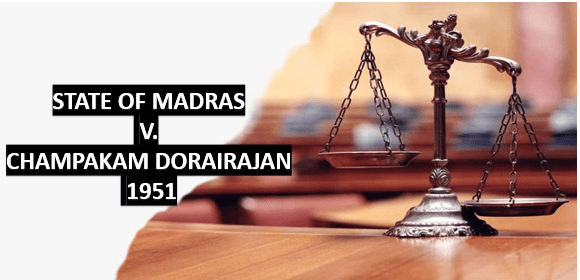
STATE OF MADRAS V. CHAMPAKAM DORAIRAJAN 1951
| Citation | 1951 AIR 226, 1951 SCR 525 |
| Date of Judgment | 09/04/1951 |
| Court | Supreme Court of India |
| Case Type | Public Interest Litigation |
| Appellant | THE STATE OF MADRAS |
| Respondent | Smt. CHAMPAKAM DORAIRAJAN |
| Bench | Kania, Hiralal J. (Cj), Fazal Ali, Saiyid, Sastri, M. Patanjali, Mahajan, Mehr Chand, Mukherjea, B.K. & Das, S. R. Bose, |
INTRODUCTION
The case of State of Madras v. Champakam Dorairajan, commonly known as the Madras Reservation Case. It is a significant landmark judgment in Indian constitutional law. The case dealt with the issue of communal reservation in educational institutions in the State of Madras.
FACTS OF THE CASE
- The Government of Madras enacted two orders in 1927 and 1931, which provided for the reservation of seats in educational institutions for different communities and castes. These orders aimed to address historical disadvantages and uplift socially and educationally backward classes.
- Champakam Dorairajan, a Brahmin student, applied for admission to a medical college in Madras in 1950 but was denied admission due to the reservation policy. She challenged the validity of the orders, claiming that they violated her fundamental rights under the Indian Constitution.
- The case reached the Madras High Court, where a division bench held that the government’s reservation orders were unconstitutional. The court stated that the orders violated Article 15(1) of the Indian Constitution, which prohibits discrimination on grounds of religion, race, caste, sex, or place of birth.
- The State of Madras appealed the decision to the Supreme Court of India, and the case was heard by a seven-judge bench.
ISSUES RAISED
The main question before the Supreme Court was whether the government’s reservation policy, which classified citizens solely on the basis of caste, violated the equality provisions of the Indian Constitution.
ARGUMENTS BY THE STATE OF MADRAS (DEFENDANT)
- Upholding social justice, The State of Madras argued that the reservation policy was necessary to address historical disadvantages faced by certain communities and castes. It aimed to promote social justice and uplift the socially and educationally backward classes.
- It argued that the policy would ensure their equitable representation in educational institutions.
- The State also argued that the reservation orders were valid under Article 15(4) of the Indian Constitution, which allows the government to make special provisions for the advancement of socially and educationally backward classes. It maintained that the orders were aimed at ensuring equal opportunities for all citizens.
ARGUMENTS BY CHAMPAKAM DORAIRAJAN (PETITIONER)
- Champakam Dorairajan argued that the reservation policy violated her fundamental rights guaranteed under Article 15(1) of the Indian Constitution.
- She contended that the policy discriminated against her solely on the basis of her caste, which was unconstitutional.
- Also argued that the reservation policy created unequal treatment among citizens based on caste. She argued that all citizens should be treated equally before the law, and any classification solely based on caste or religion went against the principles of equality.
- The petitioner argued that while Article 15(4) allowed the government to make special provisions for backward classes, it did not authorize classification solely based on caste. She contended that the reservation policy exceeded the scope of Article 15(4) and needed to be reconsidered.
JUDGMENT
- In the case of State of Madras v. Champakam Dorairajan, the Supreme Court of India delivered a landmark judgment in 1951.
- The Supreme Court held that the reservation policy, as it stood at the time, was unconstitutional. The court ruled that the policy violated the equality clause enshrined in Article 15(1) of the Indian Constitution, which prohibits discrimination on grounds of religion, race, caste, sex, or place of birth.
- The court emphasized that while Article 15(4) of the Constitution allows the government to make special provisions for the advancement of socially and educationally backward classes, these provisions should not be based solely on caste or religion. The court stressed the need for a more comprehensive approach, taking into account various factors such as social and educational backwardness, economic conditions, and individual merit.
- As a result of this judgment, the reservation policies in Madras were revised to include economic criteria alongside social and educational backwardness.
CONCLUSION
This judgment played a crucial role in shaping the jurisprudence of equality and reservation policies in India, emphasizing the importance of a holistic and inclusive approach to affirmative action. It also highlighted the need to move beyond caste-based reservations and adopt a more comprehensive approach that considers multiple factors to promote social justice and equal opportunities for all citizens.
This article is written by Mudragada Iswarya Lakshmi, a student of ICFAI Law School, Hyderabad, 6th semester, an Intern under Legal Vidhya.




0 Comments